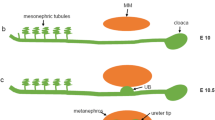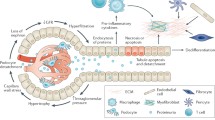Abstract.
Nephrogenesis is controlled by a sequence of inductive signals between different areas of the developing kidney. As these signals are being elucidated, it has become clear that many important developmental genes are re-expressed in the mature organ following injury, possibly as part of repair and regeneration. While this reuse of developmental pathways may contribute to healing and repair, it may alternatively result in scar formation if specific components of the pathways are missing, if the temporal correlation of various elements is faulty, or if an injurious stimulus persists. In the review we will use diabetic nephropathy as an example to illustrate this paradigm in renal disease. The pathogenesis of diabetic nephropathy is complex and characterized by altered expression of many genes, including growth factors, apoptotic regulators, cellular matrix components, and cytoskeletal proteins. Many of these factors also function during kidney development. The elucidation of the roles these genes play in nephrogenesis and of their array of molecular partners and modulators may ultimately shed light on the pathogenesis of disease (and indeed vice versa), and may even suggest new therapeutic strategies.
Similar content being viewed by others
Author information
Authors and Affiliations
Additional information
Electronic Publication
Rights and permissions
About this article
Cite this article
Dolan, V., Hensey, C. & Brady, H.R. Diabetic nephropathy: renal development gone awry?. Pediatr Nephrol 18, 75–84 (2003). https://doi.org/10.1007/s00467-002-0988-x
Received:
Revised:
Accepted:
Issue Date:
DOI: https://doi.org/10.1007/s00467-002-0988-x




